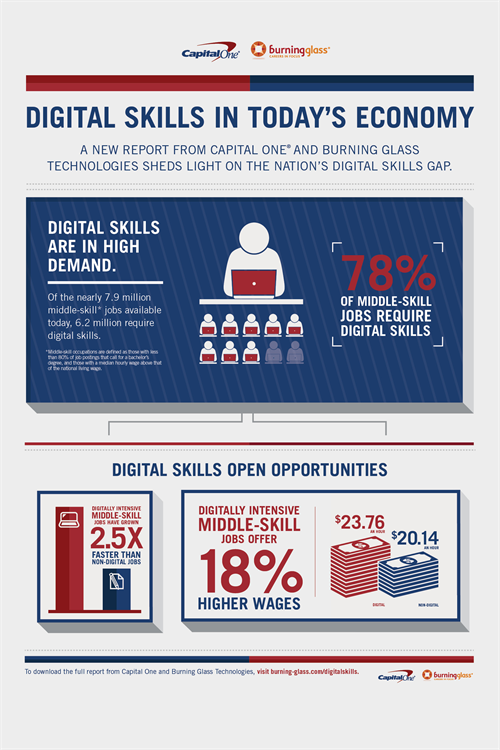Back in March, Capital One announced it will focus $150 million in community grants and initiatives over the next five years to help empower more Americans to succeed in an ever-changing, digitally-driven economy. With its new Future Edge initiative, Capital One will collaborate with leading educational and community organizations across the country to address areas of critical need that impact the nation’s current and future ability to grow and prosper in the digital age.
New Research Sheds Light on Digital Skills Gap
The launch of the Future Edge program comes at a time when technology evolution is outpacing job skills growth and dramatically altering the competitive landscape for businesses of all sizes. New research from Burning Glass Technologies and Capital One provides an in-depth look at the digital skills required in today’s middle-skill jobs; such jobs currently comprise 39 percent of total employment in the U.S. and involve lower-level jobs for which a bachelors degree is not required. Among the study’s key findings:
- Nearly eight in 10 middle-skill jobs require digital skills. Spreadsheet and word processing proficiencies have become a baseline requirement for the majority of middle-skill opportunities (78%).
- Digitally intensive middle-skill occupations are growing faster than other middle-skill jobs. Digitally intensive jobs have grown 2.5 times more rapidly than middle-skill jobs that do not require spreadsheets, word processing, or other digital skills (between 2003 and 2013, 4.7% growth for digitally intensive jobs compared to 1.9% growth for other positions).
- Digitally intensive middle-skill jobs pay more than middle-skill jobs that do not require a digital component.
- Digitally intensive middle-skill occupations offer 18% higher wages on average: $23.76 per hour compared to $20.14 per hour for all other middle-skill jobs.
- In major cities, there is greater demand for digital skills, and those positions are more likely to pay a living wage than other middle-skill jobs.
“The research shows that having digital skills has become an imperative for American workers,” said Matthew Sigelman, CEO of Burning Glass Technologies. “These are some of the best opportunities for workers without a bachelor’s degree. The digital divide we found threatens to leave too many Americans behind.”
“The impact of technology and innovation on our economy and in our daily lives is undeniable. And as technology continues to evolve, there is a greater need for people to be proficient in its use and application in order to compete, grow and prosper,” said Carolyn Berkowitz, Managing Vice President of Community Affairs at Capital One. “With Future Edge, our goal is to holistically address the digital skills gap. Working with leading educational organizations such as General Assembly and Grovo, we will cultivate creative, new ways to help ensure that the benefits of technology and innovation are being felt in communities across the country.”
New Digital Skills Lead to New Opportunities
As part of its new Future Edge initiative, Capital One launched a new partnership with global educational institution General Assembly, to support its Opportunity Fund, a fellowship program that aims to facilitate a more diverse community of talent in the tech industry by providing fellowships to low-to-moderate income individuals seeking advanced digital skills. Recipients of the new Capital One Fellowship will have full access to General Assembly’s immersive training resources, including its hiring partner network and personalized career path support in finding full-time employment following completion of the immersive program.
“General Assembly gives people the knowledge, skills and support they need to pursue a rewarding career they love. We created the Opportunity Fund to ensure that all people, regardless of income or economic status, are able to achieve an education in tech and design,” said Jake Schwartz, co-founder and CEO of General Assembly. “Capital One’s significant contribution ensures that even more people will gain the skills and resources needed to succeed in the 21st century workplace.”
Capital One also partnered with Grovo, a learning technology leader that specializes in digital skills training. With Grovo, Capital One will develop a self-directed micro-video-based digital literacy curriculum designed for people in low-to-moderate income communities to help diminish the digital skills literacy gap. Through this free curriculum, launching later this year, thousands of individuals looking to develop their basic digital skills will have access to learning and tools essential for success in the 21st century workforce.
“Grovo was founded on the belief that everyone should have access to the digital skills to thrive in the 21st century. Like Capital One, we believe digital literacy has the power to provide immeasurable opportunity,” said Grovo CEO & Cofounder Jeff Fernandez. “The specialized online curriculum we design for Future Edge will use the same cutting-edge microlearning method we use to train Fortune 500s around the globe.”
Over the next five years, Capital One will provide hundreds of grants to new and existing community-based, non-profit organizations nationwide to develop innovative programs and services to help more Americans unleash their full potential and succeed in a digital age. For more information on Capital One’s overall Investing for Good community involvement and investment efforts, please visit www.capitalone.com/investingforgood.





